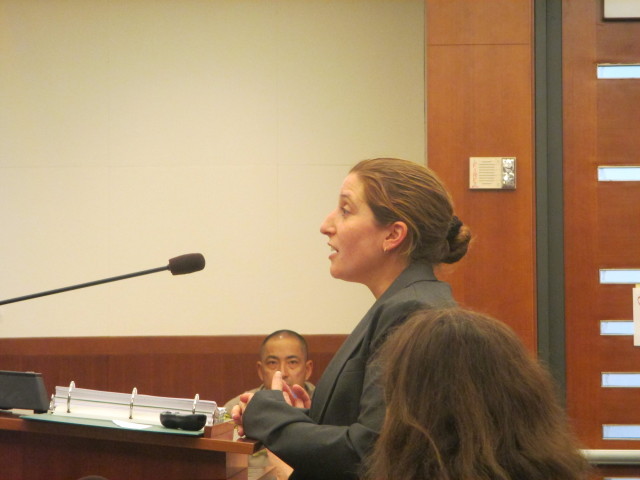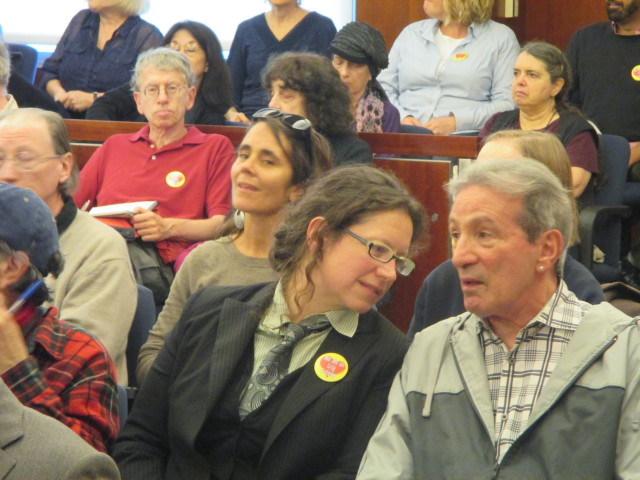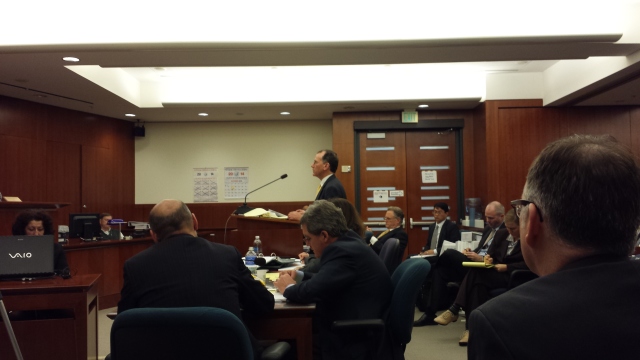
By Tim Redmond
DECEMBER 10, 2014 – The two sides in the City College trial presented final arguments yesterday – and while most of the material was a summary of facts already in evidence, attorneys for the Accrediting Commission for Community and Junior Colleges made some astonishing remarks.
In essence, they said, the ACCJC could violate the law, operate without the permission of the US Department of Education, allow obvious conflicts of interest – and still be immune to any challenge.
It was a stunning show of how deeply the agency believes that it’s above the law and accountable to nobody.
Deputy City Attorney Sara Eisenberg opened with a clear statement: This case is about fairness. The ACCJC failed to give City College a fair review and acted unlawfully, she said, and the only fair remedy is to throw out the accreditation report and start again.
She went through the evidence that was presented during the trial: The role of a Laney College administrator who was married to the president of the ACCJC in evaluating City College was an actual conflict of interest (since his school would get more students if CCSF shut down) and an apparent conflict, since any reasonable person who knew he was married to ACCJC President Barbara Beno would have lost faith in the process, she said.
The Department of Education in 2013 made clear to the ACCJC that its conflict policy wasn’t valid – and the agency has since changed its rules, she noted. “The ACCJC says that there can’t be a conflict because it didn’t violate their conflict-of-interest policy,” she noted. “But the fact that they didn’t have a valid conflict-of-interest policy in place is exactly the problem.”
The agency, she explained, was required by federal rules to have a representative number of academics – that is, teachers, not just administrators – on the team that evaluated City College. But of the 16 members of the team, only three had any valid credentials as teachers – and the Department of Education said that wasn’t enough.

Then – and probably most important – she pointed out how City College never got a fair chance to understand and respond to the charges against it. She went through a long list of items that the commission had used to terminate the school’s accreditation and noted that many of them were never included in the report that was presented to the college.
“The ACCJC acknowledges that they relied on facts not in the published accreditation standards,” she said.
She ended by saying that it’s not necessary to prove that a flawed procedure changed the outcome of the case. There’s no way to know that. The only solution is to make the ACCJC go back and do it again – legally and properly.
“The remedy for a violation of due process is a fair process,” she said. “We need to wipe away the Scarlet T.”
ACCJC attorney Kenneth Keller spent much of his time saying that there was no evidence that the commission wanted to terminate the accreditation of City College. In fact, he insisted, the agency created a whole new program – “restoration” – to give the school a second change. If anything, he said, the ACCJC went out of its way to be fair to the school.
That, of course, ignores the politics of the situation: As the ACCJC pursued its efforts to force City College to shut down, a long list of political leaders, including senior members of Congress, got into the action and put pressure on the Department of Education. The union representing City College teachers filed a complaint with the DOE, which forced the ACCJC to change its procedures.
At some point in the process, it’s pretty clear to me that the ACCJC realized it was facing a political firestorm that could undermine its very existence and was looking for a way out. That’s what “restoration” was all about.
Then Keller got into a discussion with Judge Curtis Karnow about the difference between “deficient” and “deficiency.” Kind of like arguing what the meaning of “is” is.
“One is a noun and one is a verb,” Keller said.
Actually, neither is a verb, as far as I know. “Deficient” is an adjective. But never mind: The whole discussion was about how well City College had been warned about problems, and whether those warnings actually let the school know that it was about to have its accreditation terminated. I don’t think the judge bought it.
Then Keller opened the door for the truly amazing part of the afternoon. “There is,” he said, “no law that dictates how an accrediting agency operates.”
At which point he turned things over to his colleague Andrew Sclar, who started making some remarkable claims.

Judge Karnow asked Sclar what an “academic” was, for the purposes of determining the fair makeup of an accrediting team. Sclar: “The ACCJC can define academic.” In other words, that word means whatever the hell the agency wants it to mean.
Then he went further: “Even if the ACCJC doesn’t comply with any criteria and is not recognized by the Department of Education, it can still engage in accreditation conduct,” he said. “It’s lawful to be an accreditor with no recognition at all.”
The packed courtroom erupted in a kind of stunned laughter.
He dug himself deeper: There was no conflict for the spouse of Beno, he said, because unless he was working for the same school that he was evaluating, “there was no interest.”
Wow.
Judge Karnow will issue a tentative ruling in early January.






